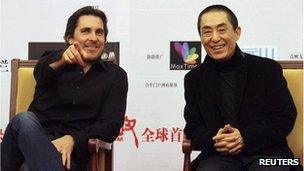Christian Bale defends 'Rape of Nanjing' film
- Published

Christian Bale (L) says the film explores how a crisis can reduce people to animalistic behaviour
Actor Christian Bale has defended his role in a Chinese-language film portraying the 1937 massacre of Chinese by Japan's imperial army in Nanjing.
Critics say the film is nationalistic and anti-Japanese, but Bale says the film is not Chinese propaganda.
"It's far more a movie about human beings and the nature of human beings' responses to crisis," he said.
The film, The Flowers of War, will be released across China on Friday and in the US in late December.
Criticism
This year China has released several big-budget epics with strong patriotic themes.
The films have coincided with a slew of major anniversaries, such as the Communist Party marking 90 years since its foundation.
And Chinese officials have encouraged film-makers to push China's message to the world.
But Bale, who last year won an Oscar for his role in The Fighter, dismissed criticism of the film.
He said it was a historical piece, and anyone describing it as propaganda was not looking at it closely enough.
He told reporters it was an exploration of how a crisis "can reduce people to the most animalistic behaviour but also raise them up to the most honourable behaviour you could ever witness".
The Nanjing massacre, which is also called the Rape of Nanjing, is one of the most notorious episodes of Japan's invasion and occupation of China.
Some 140,000 Chinese were slaughtered, according to international observers, although Chinese historians put the figure much higher.
For many Chinese, the apologies offered by Japan have never been enough, and the event still tarnishes relations between the countries.
- Published11 December 2011